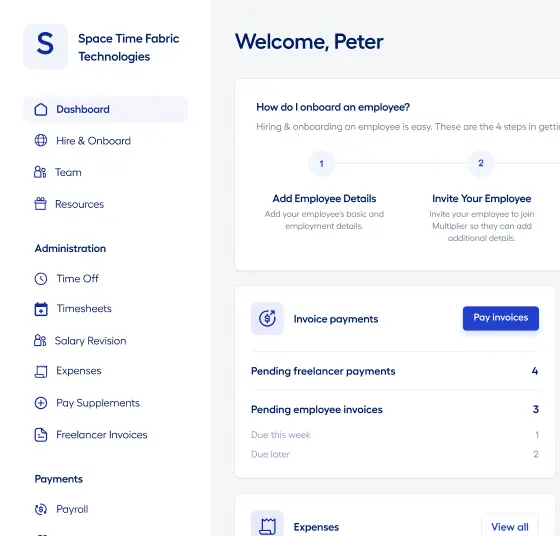Today, a significant portion of the workforce opts for freelancing as it offers them numerous benefits. With the gig economy creating numerous work opportunities across all industries, independent contracting is fast gaining ground among professionals worldwide.
Who are Independent Contractors?
Professionals usually fall into two categories based on their employment – employees and independent contractors. While employees work full-time or part-time in one organization, an independent contractor or a ‘1099 employee’ is self-employed, working for companies on a project-to-project (or on a contractual) basis. Both freelancers and consultants are independent contractors.
Generally, independent contractors work for multiple clients temporarily by advertising their skills on freelancing platforms. They enjoy the freedom of choosing clients, defining their work hours and location, service fee, etc.
Independent contracting involves people from different professions – from plumbers and electricians to content writers and graphic designers. While freelancers are a part of almost every industry, IT, construction, and business services create the most demand for freelancers. Thanks to the growing gig economy, independent freelancers have a wide range of job opportunities. Flexible hours, industry-standard pay rates, and commendable work-life balance encourage professionals to become independent contractors.
Independent contractor benefits are highly rewarding and if you want to opt for this working style, keep reading!
What are the Advantages of Being an Independent Contractor?
While employees enjoy numerous company benefits and perks, independent contractors, too, have unique perks that a traditional employee cannot avail of. Most of these perks revolve around the freedom independent contractors have over their work, along with other benefits like a simple tax-filing process and earning revenue from multiple projects simultaneously, to name a few.
Now, let’s deep dive into 1099 employee benefits!
Sense of ownership
When discussing the benefits of being an independent contractor, what attracts people is being one’s own boss. Independent contractors have complete control over their work. Apart from choosing their clients, they negotiate with clients to decide work timings, job location, payment, resources needed, etc. They only report to clients about project progress till the contract’s duration.
Independent contractors define their work ethics and exercise a sense of ownership in every project they undertake.
Tax benefits
The independent contractor tax advantages are another excellent thing about the freelancing profession. Employers do not withhold federal or state taxes for independent contractors – they only pay self-employment tax which is often lesser than what employees pay each year. However, you must know that independent contractors pay taxes quarterly, which requires systematic financial planning.
Flexible working hours
As mentioned earlier, independent contractors do not have a fixed working schedule – they can work at their convenience. So, unlike employees, independent contractors do not have to slog for a single organization from 9-5. They usually plan and organize their projects according to deadlines and determine their working hours accordingly.
Choose the client
Independent contractors work with companies with project-based employment terms. They can pick clients that offer lucrative job opportunities and better compensation than the market average. Also, independent contractors can negotiate their service charges to match their monetary targets.
Maintain a work-life balance
Since independent contractors juggle several projects simultaneously, they have stellar time-management and organization skills. They decide how much they want to take on their plate at a given time. Also, since they often work remotely in their preferred workspace, they don’t waste time commuting to and fro from work. Naturally, they can strike a much better work-life balance than employees on the payroll.
Gain a wide range of skills
While working with many clients, independent contractors are exposed to different project requirements. Consequently, they learn new things on the job. They can try related fields and gain new skills. Eventually, independent contractors become experts with a wide range of skills. This inevitably increases their market demand and rate.
Limitations of Independent Contracting
Like everything else, independent contracting has its fair share of disadvantages, including:
Limited job security
Since independent contractors work on a contractual basis, they do not have job security. Contracts usually get terminated at the stipulated time, after which they have to start the job hunt again. This can often become overwhelming and frustrating.
Earnings
As a contractor, if you’re not working, you are not earning. Contractors don’t get equal-opportunity employment benefits such as redundancy pay or medical leaves. Since they earn on a per-project basis, their income flow isn’t always the same. Thus, they must plan their finances carefully to create a safety net for months when they don’t have work.
Taxation
Companies usually withhold a certain amount from their employees’ salaries to pay taxes. However, being in the self–employed personnel category, independent contractors have to manage their taxes themselves. They must bear the burden of both the employer’s share and their share during tax filing. Thus, it’s best to use a tax consultant or advanced tax-filing software for planning your taxes.
Tip: Beware of clients who classify you as their employees. They must pay you the employer’s share of taxes and offer you employee benefits if they do. However, since this would be employee misclassification, you should clear this issue with your clients in advance to avoid legal troubles.
Conclusion
The bottom line – the benefits of being an independent contractor far outweigh its limitations. Independent contractors can easily circumvent the disadvantages with careful planning and calculated strategies.
If you seek to take advantage of 1099 employee benefits, you should hire a global PEO firm like Multiplier. Our in-house experts can seamlessly manage your payment requirements. For instance, we can streamline your monthly payments and get payslips from your employers in any corner of the world in your local currency. Moreover, we promise to help you get all the independent contractor benefits you deserve. So rest assured, we’ll have you covered.
FAQs
Q. Where do you start when beginning as an independent contractor?
The first thing you must do is register your business when starting as an independent contractor. The next step is to understand how your business structure and budgeting needs.
Q. How to strategize growth as an independent contractor?
Always make a solid business plan. Take note and plan what your expenses are against your earnings. Fix your base rates and related charges. Hire people if you need add-on support in any form.
Q. Do independent contractors need insurance?
Yes, independent contractors also need insurance to protect themselves from physical or legal damages.







